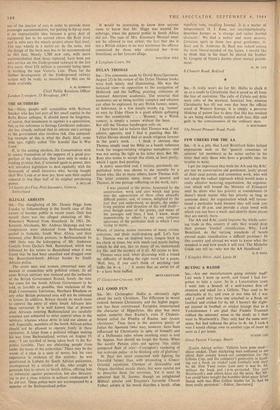DYLAN THOMAS S1R,—The comments made by David Rees (Spectator, August
21) in his review of the Dylan Thomas books were both timely and illuminating. His was the balanced view—in opposition to the castigation of Holbrook and the baffling, praising, criticisms of bemused American academics. The material that academics see as being terribly complex and obscure can often be explained, by any Welsh farmer, miner, or fisherman, in a few simple words, e.g. 'runner' as seen by Elder Olson is a giant athlete galloping over the countryside. . . . 'Runner,' in a Welsh context, is simply a runner without the bean. . . But still the Thomas bandwagon rolls on.
I have been led to believe that Thomas was, if not atheist, agnostic, and I find it puzzling that Mr. Talfan Davies should find so much religious fervour in the poet's work . . . I think it obvious that Thomas simply used the Bible as a handy reference book for tongue-twisting religious metaphors—and was not seeing the light in his latter days. But Mr. Rees also seems to accept this claim, at least partly, which I again find puzzling.
A newly unearthed and, I believe, previously un- published letter was shown to me recently by a friend who, like so many others, knew Thomas well. The letter contains many items of interest and Thomas, in one passage reflecting on his work, says: I was amazed at the praise; honoured by the construction, work and care which had gone into the appreciation of these often absurdly difficult poems; and, of course, delighted by the fact that you understood, so deeply, the under- lying purpose and direction of the stuff itself— even though some of the poems, and many of the passages and lines, I had, I knew, made impenetrable to others by my own tortuous ignorance of the particular dark in which I was trying to move. . . .
Which, of course, makes nonsense of many claims, criticisms, and plain myth-making guff. Let's face it: Thomas was an inspired boyo, tongue hard in his cheek at times, but with much real poetic feeling (which he did not, like so many of us, understand) for life, and the mystery of it all. All praise to him.
Thomas once said, when discussing with a friend the difficulty of finding the right word for a poem, 'Well, boy, if you can't think of anything—just baffle the b—s. . . it seems that an awful lot of b—s have been baffled.
17 Gloucester Crescent, NW! BRYN GRIFFITHS






































 Previous page
Previous page